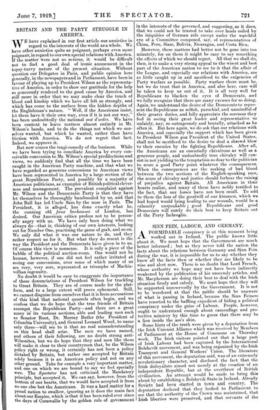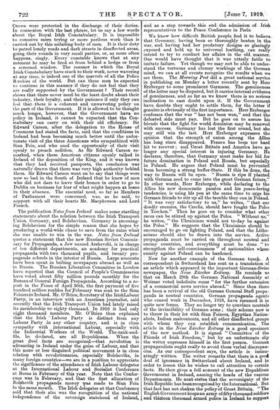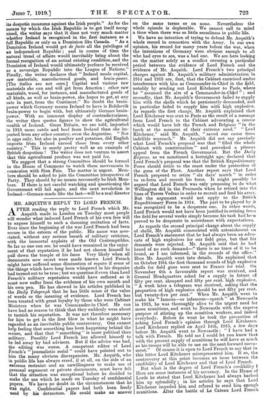SINN FEIN, LABOUR, AND GERMANY.
AFORMIDABLE conspiracy is at this moment being worked out in Ireland. The public knows little about it. We must hope that the Government are much better informed ; but as they never told the nation the facts about the relations between Germany and Sinn Fein during the war, it is impossible for us to say whether they knew all the facts then or whether they are likely to be wise and alert now. There is no doubt that Lord French, whose authority we hope may not have been indirectly weakened by the publication of his unseemly articles, and Mr. Macpherson are doing their best to deal with the Irish situation firmly and calmly. We must hope that they will be supported unreservedly by the Government. It is not to be wondered at that the public should be unaware of what is passing in Ireland, because the Sinn Feiners have resorted to the baffling expedient of hiding a political conspiracy under the guise of Labour. People, however, ought to understand enough about camouflage and pro- tective mimicry by this time to guess that there may be a lion inside the ass's skin.
Some hints of the truth were given by a deputation from the Irish Unionist Affiance which was received by Members of Parliament at the House of Commons on Thursday week. The Irish visitors pointed out that a large part of Irish Labour had been captured by the International Bolshevik movement, and was being organized by the Irish Transport and General Workers' Union. The literature of this movement, the deputation said, was of an extremely revolutionary character, and disclosed the fact that the Irish disloyalists aimed not merely at the creation of an independent Republic, but at the overthrow of British civilization. Au attempt would be made to bring this about by establishing a Bolshevik State in Ireland. Already Soviets had been started in town and country. The deputation declared that they looked to Parliament to see that the authority of the Crown was maintained, that Irish liberties were preserved, and that servants of the
Crown were protected in the discharge of their duties. In connexion with the last phrase, let us say a few words about the Royal Irish Constabulary. It is impossible to conceive more trying or more perilous work than is carried out by. this unfailing :body of men. It is their duty to-patrol lonely roads and dark streets in disaffected areas, going their rounds in very small parties, or, as more often happens, singly._ Every constable knows that at any moment he may be fired at from behind a hedge or from a screened. window. The manner in which the. Royal Irish Constabulary have stuck to their work, never wavering at. any time, is indeed one of the marvels of all the Police Snwices of the world. But can these men be expected to continue in this. manner if they do.not feel that they are really supported-lay the .Government I Their record shows that there never need, be the least doubt about their industry, their loyalty, and their patience if only they can feel that there is a coherent and unwavering polioy on the part of the Government. If it is allowed.to bethought much longer, however, that the Government have no policy in. Ireland, it cannot be expected that the Con- stabulary can carry on with their old efficiency. Sir Edward Carson, after the delegation to the- House of Commons had stated the facts, said that the conditions in Ireland had been becoming much better until the unfor- tunate visit of Pie three Americans who sympathized with Sinn Fein, and who used the opportunity of their visit- openly to preach sedition. As Sir Edward- Carson re- marked, when these American citizens openly talked in Ireland of the deposition of the King, and it was known that they had received passports, the conclusion was naturally drawn that there was very high authority behind them. Sir Edward Carson went on to say that things were. now so bad in the South of Ireland that he knew of men who did not dare to leave their- homes in order to go to Dublin on business for fear of what might happen at home in their absence. The essential need, so far as Members of, Parliament were concerned, was, as he--said, to support with all their hearts Mr. Macpherson and. Lord French.
The publication Notes from Ireland makes some startling statements about the relation between the Irish Transport Union, Germany, and Bolshevism. Germany is encourag- ing Bolshevism for the simple reason that she hopes by producing a world-wide chaos to save from the ruins what she was unable to win in the war. Notes from Ireland quotes a statement that the new Russian Soviet Commis- sary for Propaganda, a Jew named Arshevski, is in charge of ten different departments, an academy for practical propaganda with two thousand pupils, and twenty pro- paganda schools in the interior of Russia. Large amounts. have been spent in bribing newspapers abroad as well as in Russia. The Russian Liberation Committee in London have reported that the Council of People's Commissaries have voted about fifty million pounds monthly for the Bureau of General Foreign.Propaganda. According to a re- port in the Times of April 30th, the first payment of five hundred million roubles foiYebruary was sent. to the Sinn. Feiners in Ireland.. Mr. O'Brien, Secretary of the IrishLabour Party, in an interview with an American journalist, said recently that the Irish Transport Union had lately raised its membership to eighty thousand. In 1916 it had only eight thousand members. Mr. O'Brien then explained that the Irish ' Labour Party is distinct from any Labour Party in any- other country, and is in close sympathy with international Labour, especially with the Industrial, Workers of the World. The-rank-and- file, he declared, are all Republicans. When the great dual facts are recognized—that revolution is advancing in Ireland under the guise of Labour, and that this more or less disguised political movement is in close relation with revolutionaries, especially Bolsheviks, in many foreign countries—we are in a position to appreciate the significance of the attendance of Irish Labour delegates at the International Labour and Socialist conference at Berne in February of this year. Note that the Confer- ence was in February, and that the first allocation of Bolshevik propaganda money yes made to Sinn Fein in the same month. The Irish delegates at that Conference said that their aim was the recognition of the national independence of the sovereign statehood of Ireland,
and as a step towards this end. the. admission of- Irish representatives to the Peace Conference in Paris.
We know how difficult British people find it to. believe. that. Germany, having been so thoroughly beaten in the- war, and having had her predatory designs so glaringly exposed. and held up to universal loathing, can really intend to try to conduct her affairs in the old manner. One would have thought that. it was utterly futile to imitate failure. Yet though we may not be able to under- stand the. tortuous and clumsy workings of the german mind, we can at all events recognize the results when we see them. The Morning Post did a great national service in publishing on Monday a letter recently sent by Herr -Erzberger to some prominent Germans. The genuineness of the letter may be disputed, but it carries internal evidence of genuineness, and so far as we know there is no serious inclination to cast doubt upon. it. If the Government have doubts they ought to settle them, for the letter if genuine is obviously of the first importance. Herr Erzberger confesses. that the war " has not been won," and that the defeated side must pay. But he goes on to assure his friends that the fight for world dominion may be renewed with success. Germany has lost the first round, but she may still win the last Herr Erzberger expresses the opinion that the strength of union among the Allies has. long since disappeared. France has beep too hard hit to recover ;. and Great. Britain and America have no longer any special interest in injuring Germany. He declares, therefore, that Germany must make her bid.for future domination in Poland and Bussia, but especially in Poland. He argues that Poland must be prevente,,d from becoming a strong buffer-State. If this be done,the ' way to. Russia will be open. " Russia is ripe if planted with German seed to come into the great German future," In other words, Herr Erzberger, while declaring to the Allies . his new democratic passion and his peace-loving tendencies, is using his pen at the same time to urge his German friends to stir up all the trouble they can in Poland. " It was very satisfactory to us," he writes, " that- our deadly enemies, the Czechs, should have fought -the Poles in Tesehen." Then he goes on to consider what other races can be stirred up against the Poles. " Without us," he writes, " the Ukrainians would not to-day be against the Poles." He suggests that the Ukrainians should be encouraged to go on fighting Poland, and that the Lithu- anians should also be drawn into the service. Active propaganda must be carried on throughout neutral -and enemy countries, and everything, must bo done. " to strengthen the self-consciousness " of nationalities wllose enmity against Poland can be hardened.
Now for another example of the German touch. A correspondent in Switzerland, has sent us a translation of an article which appeared in the important German-Siviss newspaper, the Neue Zurcher Zeitungl lie reminds us that on March 29th the German. National Assembly at Weimar voted indefinite sums " for the further extension of a commercial news service abroad." Since then there has been a revival of the old German General Staff propa- ganda in neutral countries. German propaganda agents who ceased work in December, 1918, have resumed it in quite new forms. They no longer try to convince neutrals of the invincibility of German arms ; their scheme now is to throw in their lot with-Sinn Feine,ra, Egyptian Nation- alists, Indian malcontents, and all other disaffected groups with whom they can establish communication. The article in the Neue birder Zeitung is a good specimen of the new method. It is signed " Committee. of the Friends of Irish _Freedom," but by an unfortunate slip the writer expresses himself in the first person. German propagandists ought really to avoid these verbal discrepan- cies. As our correspondent says, the article is . insinu- atingly, written. The writer remarks that there is a good deal of ignorance in Switzerland. about Ireland; and in order to lessen this. he wishes to call attention to certain facts. He then gives a full account of the new Itepublican Government in. Ireland, naming the heads of the various Departments. He next states that the sovereignty of the Irish Republic has been recognized by the InternationaL But that fact has not shaken the policy of Great Britain. "The
English Government keeps an army of thousand soldiers and thirteen thousand ,armed police in Izeland.to support
its despotic measures against the Irish people." As for the means -by which the Irish Republic is to get itself recog- nized, the writer says that it does not very much matter whether Ireland is recognized in the first instance as a full Republic or only as a Dominion like Canada. " As a Dominion Ireland would get .de facto all the privileges of an independent Republic ; and in course of time the natural trend of affairs would inevitably bring about the formal recognition of an actual existing condition, and the Dominion of Ireland would ultimately perforce be received as a sovereign Republic into the League of Nations." Finally, the writer declares that " Ireland needs capital, raw materials, manufactured goods, and brain-power. [The italics are not ours.] Capital and various raw materials she can and will get from America ; other raw materials, wood, for instance, and manufactured goods of all kinds, as well as brain-power, she hopes to get, at any rate in part, from the Continent." No doubt the brain- power which Germany means Ireland to have is Bolshevik brain-power to begin with, but ultimately German brain- power. With an innocent display of contradictori,ness, the writer then quotes figures to show the agricultural wealth of Ireland. Great Britain, we are told, imported in 1915 more cattle and beef from Ireland than she im- ported from any other country, even the Argentine. " Not in eggs only, but also in poultry and potatoes, did English imports from Ireland exceed those from every other country." This is surely pretty well as an example of British despotism ! The writer does not venture to assert that this agricultural produce was not paid for.
We suggest that a strong Committee should be formed in the House of Commons to watch these movements in . connexion with Sinn Fein. The matter is urgent. Mem- bers should be asked to join the Committee irrespective of Party. They should by no means necessarily bearish Mem- bers. If there is not careful watching and questioning the Government will fail again, and the next revolution in Ireland—German-made like the last—will be a real disaster




































 Previous page
Previous page